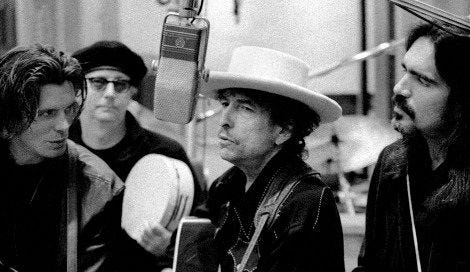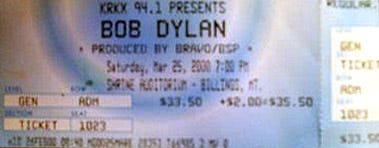Flagging Down the Double E’s is an email newsletter exploring Dylan shows of yesteryear. Subscribe here to get a new entry delivered to your inbox every week:
As some of you know, my main gig is writing about cover songs. I've got a blog, a book, and a second book on the way on the subject. And spring 2000 was one hell of a tour for covers. I haven't really dug deep into them yet, so I'm going to explore Bob’s spring-2000 covers over the next few newsletters.
I've divided the covers into three categories, named after Bob Seger songs mostly because I was listening to Live Bullet at the time: Heavy Music (gospel), Lookin' Back (folk standards), Old Time Rock and Roll (old time rock and roll). Today: Heavy Music.
Dylan played seven gospel songs on this spring 2000 tour. All appeared during the show-opening acoustic set, and mostly opened or closed it. In fact, he began every single show with a cover of a gospel or folk song.
Most of the gospel songs he appeared to learn from a single source. And calling them "gospel" is slightly misleading. They're religious, certainly, but these songs don't come from the black church tradition. They come instead from the world of bluegrass. Largely one bluegrass band in particular.
Dylan's relationship with the Stanley Brothers' music goes back decades. In Chronicles, he mentions Izzy Young playing him bluegrass records when he first came to New York, which surely would have included theirs. It's reasonably likely he learned "Man of Constant Sorrow" from the Stanley Brothers' then-popular version, as he mirrors their lyrics on his debut album. But the relationship peaked in the late ‘90s.
In November 1997, Dylan recorded a duet with Ralph Stanley for the latter's duets album Clinch Mountain Country. When the album came out a couple years later, Dylan was quoted in the press materials calling singing with Stanley "the highlight of my career." He chose "The Lonesome River" for the album, but had clearly done a Stanley Brothers deep dive as research. That fall, right around his session with Stanley, he began covering three of their songs live: "I'll Not Be A Stranger, "Stone Walls And Steel Bars," and "White Dove" - the only one of the three he also sang on this 2000 run. (Strangely, he never performed the song he recorded for the album live).
Two years later, in spring and summer 1999, he added several more Stanley Brothers tunes that remained staples in 2000. First up was "Hallelujah, I'm Ready to Go." A traditional bluegrass tune of unknown providence, it has been covered by just about every famous bluegrass name: Bill Monroe, Ricky Skaggs, and, of course, the brothers Stanley. This is best of the bunch, as determined by the objective authority (me). Like all of these, it features full-band vocals, modeled off the Stanleys’ version, offering a rousing way to open shows like today's, the third of Bob’s Montana trio. Acoustic, yes. Quiet and mellow, not at at all.
A month later in 1999, he added another bluegrass-gospel number from the Stanley songbook, "Somebody Touched Me." Though often labelled as traditional, many think it was in fact an original of John Reedy And His Stone Mountain Hillbillys in 1949. Their version set the template that both the Stanley Brothers and then Bob would more or less follow. He played this less than the other two; only twice this spring 2000 tour. However, I believe it's the only one to get an official release; Sony released a fall 2000 concert recording to kick off the 2001 Japan and UK compilation Live 1961–2000: Thirty-Nine Years of Great Concert Performances.
Two more months after that, September 1999, he added Ralph Stanley's original composition "I Am the Man, Thomas." It became Bob's most frequent bluegrass-gospel opener overall, though on this 2000 leg he dropped it after the first week. As a fanzine article from a couple years later notes, it's the first song since Dylan has sung from the point of Jesus since the gospel-era cover "Rise Again."
Dylan used all three of those as regular show openers. But they wouldn't be the last Stanley Brothers gospel tune an audience member attending a spring 2000 show was likely to hear. Tomorrow: Heavy Music, part two.





Very insightful, thank you! I've often wondered about this since hearing Bob sing "Humming Bird" and "This World Can't Stand Long" back in 2001. He really did those songs justice.